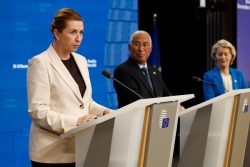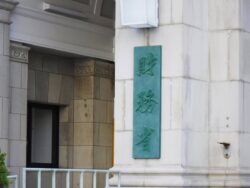
Sinn Fein Vice President Michelle O’Neill walks through Stormont Parliament Buildings in Belfast, Northern Ireland, Saturday, Feb. 3, 2024.
12:52 JST, February 4, 2024
LONDON (AP) — An Irish nationalist made history Saturday by becoming Northern Ireland’s first minister as the government returned to work after a two-year boycott by unionists.
Sinn Fein Vice President Michelle O’Neill was named first minister in the government that under the terms of the 1998 Good Friday peace accord shares power equally between Northern Ireland’s two main communities — British unionists who want to stay in the U.K., and Irish nationalists who seek to unite with Ireland.
Northern Ireland was established as a unionist, Protestant-majority part of the U.K. in 1921, following independence for the Republic of Ireland, so O’Neill’s nomination was seen as a highly symbolic moment for nationalists.
“This is a historic day which represents a new dawn,” O’Neill said. “That such a day would ever come would have been unimaginable to my parents and grandparents’ generation. Because of the Good Friday Agreement that old state that they were born into is gone. A more democratic, more equal society has been created making this a better place for everyone.”
O’Neill will share power with deputy first minister Emma Little-Pengelly from the Democratic Unionist Party. The two will be equals, but O’Neill, whose party captured more seats in the Northern Ireland Assembly in the 2022 elections, will hold the more prestigious title.
Neither side can govern without agreement from the other. Government business ground to a half over the past two years after the DUP walked out to protest trade issues related to Brexit.
O’Neill, 47, who was born in the Republic of Ireland but raised in the north, comes from a family with links to the militant Irish Republican Army. Her father was imprisoned as an IRA member, an uncle raised money for the group and two of her cousins were shot — one fatally — by security forces.
O’Neill has been criticized for attending events commemorating the IRA and told an interviewer there was “no alternative” to the group’s armed campaign during the Troubles, a period of about 30 years of violent conflict over the future of Northern Ireland, which ended with the Good Friday accords.
“I don’t think any Irish person ever woke up one morning and thought that conflict was a good idea, but the war came to Ireland,” she said in 2022. “I think at the time there was no alternative, but now, thankfully, we have an alternative to conflict and that’s the Good Friday agreement.”
At 15, O’Neill became pregnant and her mother quit work to help raise her granddaughter so O’Neill could stay in school. She said the Catholic school she attended had not been supportive and pregnancy had been a “very negative” experience.
“You were nearly made to feel girls like you can’t be at school, that kind of a thing,” she said.
As a member of Sinn Fein, the party affiliated with the IRA, O’Neill was elected in 2005 to the Dungannon Borough Council, replacing her father. She was elected to the Stormont Assembly in 2007.
Both O’Neill and Little-Pengelly, 44, grew up under the shadow of the Troubles and pledged to work together to bridge divides that once seemed insurmountable.
“The past with all its horror can never be forgotten, and nor will it be allowed to be rewritten but while we are shaped by the past, we are not defined by it,” Little-Pengelly said. “The experience of my childhood gave me the drive and desire to make a different future not just for myself, but to do all that I could and can to ensure a better future for all of us.”
Former Sinn Fein president Gerry Adams, who helped broker the historic peace agreement, was in the gallery to witness O’Neill’s nomination along with her grown up daughter and son.
“As an Irish republican, I pledge cooperation and genuine honest effort with those colleagues who are British, of a unionist tradition, and who cherish the Union,” O’Neill said. “This is an assembly for all — Catholic, Protestant and dissenter.”
U.S. President Joe Biden welcomed the restoration of the Northern Ireland executive and assembly. In a statement from the White House, he said, “I look forward to seeing the renewed stability of a power-sharing government that strengthens the peace dividend, restores public services, and continues building on the immense progress of the last decades.”
Clare Rice, an academic researcher in politics, said O’Neill’s new position was “hugely symbolic” and “hugely significant” despite there being no difference beyond semantics from her previous role as deputy first minister.
“All eyes today will be on that symbolic nomination,” Rice told the BBC. “That is going to be the story that comes out of today, second only to the fact that we’re here at all.”
The return to government came exactly two years after a DUP boycott over a dispute about trade restrictions for goods coming into Northern Ireland from Great Britain. Northern Ireland’s 1.9 million people were left without a functioning administration as the cost of living soared and public services were strained.
An open border between the north and the republic was a key pillar of the peace process that ended the Troubles, so checks were imposed instead between Northern Ireland and the rest of the U.K.
An agreement a year ago between the U.K. and the EU, known as the Windsor Framework, eased customs checks and other hurdles but didn’t go far enough for the DUP, which continued its boycott.
The U.K. government this week agreed to new changes that would eliminate routine checks and paperwork for most goods entering Northern Ireland, although some checks will remain for illegal goods or disease prevention.
The new changes included legislation “affirming Northern Ireland’s constitutional status” as part of the U.K. and gives local politicians “democratic oversight” of any future EU laws that might apply to Northern Ireland.
The U.K. government also agreed to give Northern Ireland more than 3 billion pounds ($3.8 billion) for its battered public services once the Belfast government is back up and running.
“I believe that my party has delivered what many said we couldn’t,” DUP leader Jeffrey Donaldson said outside the assembly chamber in Stormont. “We have brought about change that many said was not possible, and I believe that today is a good day for Northern Ireland, a day when once again our place in the United Kingdom and its internal market is respected and protected in our law and restored for all our people to enjoy the benefits of our membership of the union.”
Former DUP leader Edwin Poots was elected as speaker of the chamber.
"News Services" POPULAR ARTICLE
-

American Playwright Jeremy O. Harris Arrested in Japan on Alleged Drug Smuggling
-

Japan’s Nikkei Stock Average as JGB Yields, Yen Rise on Rate-Hike Bets
-

Japan’s Nikkei Stock Average Licks Wounds after Selloff Sparked by BOJ Hike Bets (UPDATE 1)
-

Japanese Bond Yields Zoom, Stocks Slide as Rate Hike Looms
-

Japan’s Nikkei Stock Average Buoyed by Stable Yen; SoftBank’s Slide Caps Gains (UPDATE 1)
JN ACCESS RANKING
-

Keidanren Chairman Yoshinobu Tsutsui Visits Kashiwazaki-Kariwa Nuclear Power Plant; Inspects New Emergency Safety System
-

Imports of Rare Earths from China Facing Delays, May Be Caused by Deterioration of Japan-China Relations
-

University of Tokyo Professor Discusses Japanese Economic Security in Interview Ahead of Forum
-

Japan Pulls out of Vietnam Nuclear Project, Complicating Hanoi’s Power Plans
-

Govt Aims to Expand NISA Program Lineup, Abolish Age Restriction


























